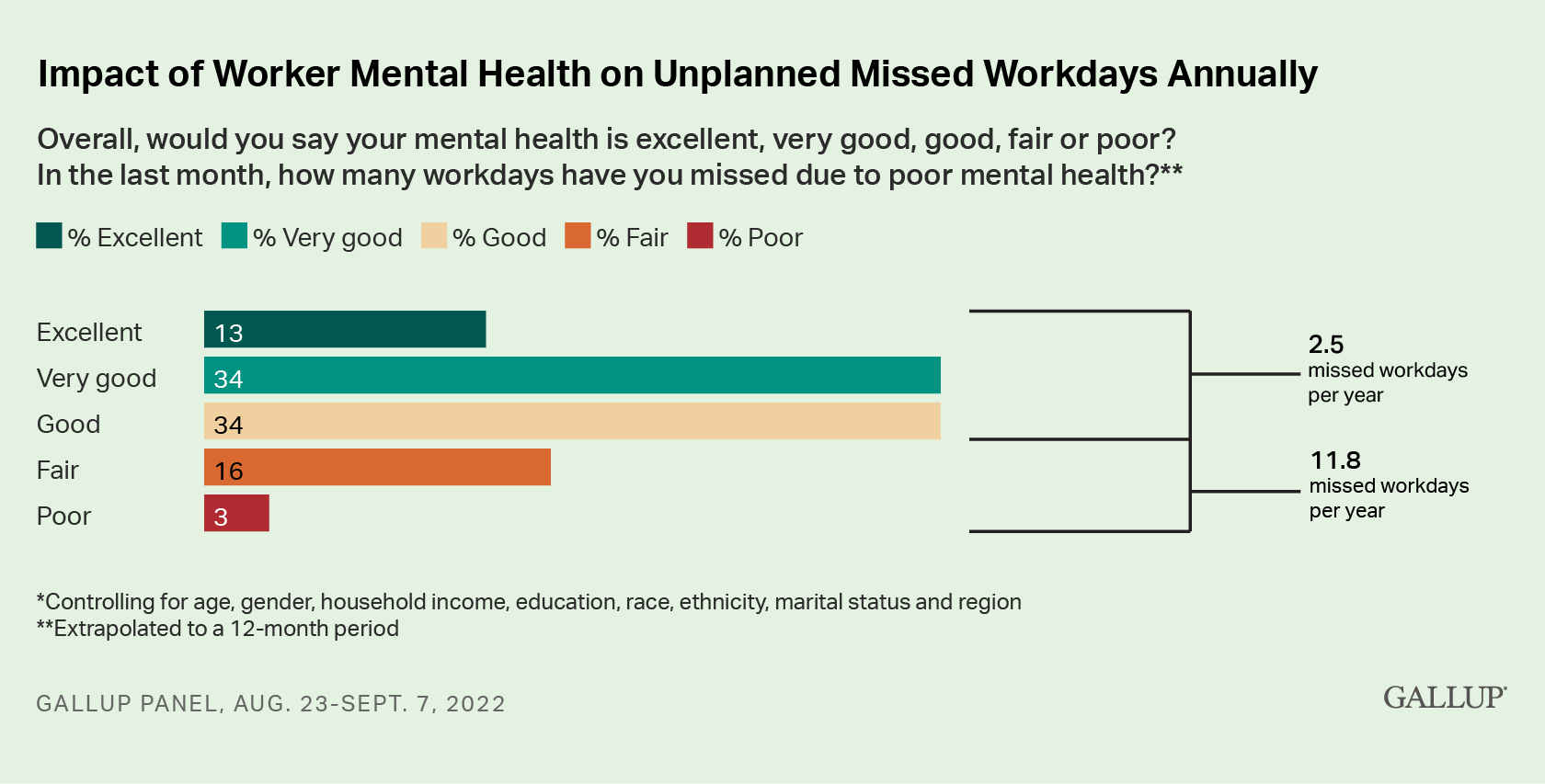Mental Health In The Workplace: A Policy-Driven Approach To Increased Productivity

Table of Contents
The Business Case for Prioritizing Mental Health
Investing in employee mental well-being translates directly into a stronger bottom line. A healthy workforce is a productive workforce.
Reduced Absenteeism and Presenteeism
Mental health issues significantly contribute to both absenteeism (days missed due to illness) and presenteeism (reduced productivity while at work). Employees struggling with anxiety, depression, or burnout often experience:
- Difficulty concentrating and making decisions
- Decreased engagement and motivation
- Increased errors and mistakes
- Reduced creativity and problem-solving abilities
According to the World Health Organization, depression and anxiety disorders cost the global economy an estimated $1 trillion annually in lost productivity. Addressing mental health in the workplace directly combats these losses.
Improved Employee Engagement and Morale
Employees who feel supported and valued are more engaged and productive. A positive correlation exists between mental well-being and:
- Increased job satisfaction
- Higher levels of motivation
- Stronger teamwork and collaboration
- Improved communication
Implementing initiatives like team-building activities, employee recognition programs, and flexible work arrangements can significantly improve employee engagement and morale, fostering a healthier and more productive work environment. Studies show that companies with strong mental health programs experience a 25% increase in employee engagement.
Enhanced Company Reputation and Attracting Top Talent
Today's workforce increasingly values companies that prioritize employee well-being. Demonstrating a commitment to mental health in the workplace enhances your company's reputation, attracting and retaining top talent.
- A positive employer brand attracts job seekers seeking supportive work environments.
- Employees are more likely to stay with companies that actively support their mental health.
- Reduced turnover saves recruitment costs and maintains institutional knowledge.
Data suggests that 75% of job seekers consider a company's commitment to employee well-being a key factor in their decision-making process.
Implementing Effective Mental Health Policies
Creating a truly supportive workplace requires a comprehensive and strategic approach.
Creating a Supportive and Inclusive Workplace Culture
Open communication is key. Reduce stigma by:
- Providing training programs for managers and employees on mental health awareness and sensitivity.
- Implementing mental health days as part of the company's leave policy.
- Offering flexible work arrangements to accommodate employees' needs.
- Creating a safe space for employees to discuss mental health concerns without fear of judgment.
Providing Access to Mental Health Resources
Offering comprehensive resources demonstrates your commitment. These might include:
- Employee Assistance Programs (EAPs) offering confidential counseling and support.
- Comprehensive mental health insurance coverage.
- Mindfulness programs and stress management workshops.
- Access to mental health apps and helplines.
- Subsidized gym memberships and wellness initiatives.
Measuring the Impact of Mental Health Initiatives
Regularly track key metrics to assess the effectiveness of your programs:
- Absenteeism rates
- Employee engagement scores (through surveys)
- Employee feedback (through focus groups and regular check-ins)
- Productivity metrics
Analyzing this data allows you to refine your strategies and demonstrate the ROI of your investment in employee mental well-being.
Addressing Specific Challenges in Implementing Mental Health Policies
Implementing effective policies requires addressing potential obstacles.
Overcoming Stigma and Encouraging Open Communication
Creating a safe space for employees to discuss mental health requires a multifaceted approach. This includes:
- Leading by example: Senior leadership must openly advocate for mental health support.
- Utilizing anonymous surveys to gather feedback without fear of reprisal.
- Holding open forums to discuss mental health in a safe and supportive environment.
Balancing Employee Privacy and Company Needs
Maintaining confidentiality is paramount. Establish clear policies that:
- Outline how confidential information will be handled.
- Respect employee rights and privacy.
- Ensure compliance with relevant data protection regulations.
Managing Costs and Resources Effectively
Implementing mental health initiatives doesn’t have to be expensive. Explore:
- Leveraging existing resources within your company.
- Partnering with local mental health organizations.
- Utilizing telehealth options for cost-effective access to mental health professionals.
- Seeking grants or subsidies from relevant organizations.
Conclusion
Prioritizing mental health in the workplace is not just a social responsibility; it's a sound business strategy. By implementing supportive policies, fostering a culture of well-being, and actively measuring the impact of your initiatives, you can create a healthier, happier, and significantly more productive workforce. The return on investment in employee mental health is substantial. Start today by conducting a workplace mental health assessment, researching available resources, or contacting a mental health professional for consultation. Invest in your employees' well-being – invest in your company's success.

Featured Posts
-
 Avrupa Birligi Ile Is Birligimizin Gelecegi Yeni Stratejiler
May 02, 2025
Avrupa Birligi Ile Is Birligimizin Gelecegi Yeni Stratejiler
May 02, 2025 -
 Mlw Battle Riot Vii Bobby Fish Officially Announced
May 02, 2025
Mlw Battle Riot Vii Bobby Fish Officially Announced
May 02, 2025 -
 Loyle Carner Announces 3 Arena Dublin Concert Date Tickets And More
May 02, 2025
Loyle Carner Announces 3 Arena Dublin Concert Date Tickets And More
May 02, 2025 -
 Stroomnetaansluiting Kampen Gemeente Start Kort Geding Tegen Enexis
May 02, 2025
Stroomnetaansluiting Kampen Gemeente Start Kort Geding Tegen Enexis
May 02, 2025 -
 Arc Raiders Second Public Test Coming Later This Month
May 02, 2025
Arc Raiders Second Public Test Coming Later This Month
May 02, 2025
Latest Posts
-
 Astratyjyt Astthmaryt Jdydt Lljbht Alwtnyt Tfasyl Wrqt Alsyasat
May 03, 2025
Astratyjyt Astthmaryt Jdydt Lljbht Alwtnyt Tfasyl Wrqt Alsyasat
May 03, 2025 -
 Aljbht Alwtnyt Teln En Wrqt Syasat Astthmaryt Jdydt
May 03, 2025
Aljbht Alwtnyt Teln En Wrqt Syasat Astthmaryt Jdydt
May 03, 2025 -
 Can Reform Uk Deliver For Farmers A Critical Analysis
May 03, 2025
Can Reform Uk Deliver For Farmers A Critical Analysis
May 03, 2025 -
 Wrqt Syasat Aqtsadyt Mn Amant Alastthmar Baljbht Alwtnyt
May 03, 2025
Wrqt Syasat Aqtsadyt Mn Amant Alastthmar Baljbht Alwtnyt
May 03, 2025 -
 Amant Alastthmar Baljbht Alwtnyt Wrqt Syasat Aqtsadyt Jdydt
May 03, 2025
Amant Alastthmar Baljbht Alwtnyt Wrqt Syasat Aqtsadyt Jdydt
May 03, 2025
